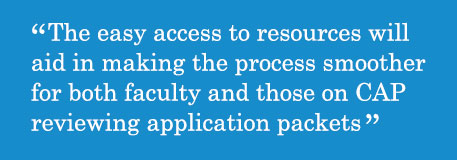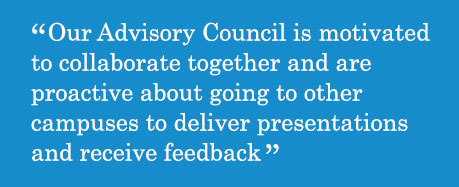New Online Module for Mentoring, Promotion, and Advancement
A new online educational module takes a personalized approach to the advancement, and promotion (PMAP) process by linking it with mentoring and adjusting according to each faculty member’s series, step, and rank. The PMAP module provides individualized education and is accessible through the MyAccess single sign-in page. The module is separate from the Advance System, but should be used in conjunction with Advance when faculty members compile their packet in preparation for an upcoming personnel action.
Current and former Committee on Academic Personnel (CAP) members formed the PMAP Advisory Council two years ago to create a module. CAP, which makes peer-reviewed recommendations to the Vice Provost of Academic Affairs concerning appointments, advancements, reviews, policy, and related matters. CAP wanted to educate faculty on what they examine during the review process. CAP also sought to put in straightforward language in the criteria and expectations for each series, rank, and step that’s found in the Academic Personnel Manual (APM).PMAP Advisory Council members recognize that the promotion and advancement process can be complicated as expectations vary by series, rank, and step. A select few former members of CAP volunteer to serve on the PMAP Advisory Council to keep the module current.
“The module will contain the most current information from resources all in one place,” Yee said. “The easy access to resources will aid in making the process smoother for both faculty and those on CAP reviewing application packets.”
History and Future of PMAP
The Office of Academic Affairs’ Faculty Mentoring Program seeks to create and support a climate of mentorship that helps faculty through advancement and promotion and aims to improve career satisfaction. Mitch Feldman, MD, MPhil. is the Associate Vice Provost of Faculty Mentoring and leads the program, working closely with the Campus Council on Faculty Life. Through Feldman’s leadership, the campus began and continues to host mentoring lectures, and developed a Mentoring Toolkit, which other Universities have referenced.
 Separately, the Clinical and Translational Science Institute (CTSI) developed its Comprehensive Mentoring Program (CMP) to train current and future mentors across campus. Mandana Khalili, MD, Professor of Clinical Medicine in the School of Medicine is the current Co-Director of the CMP along with Mitch Feldman, Director of the CMP.
Separately, the Clinical and Translational Science Institute (CTSI) developed its Comprehensive Mentoring Program (CMP) to train current and future mentors across campus. Mandana Khalili, MD, Professor of Clinical Medicine in the School of Medicine is the current Co-Director of the CMP along with Mitch Feldman, Director of the CMP.
While these programs accomplish much, the PMAP Advisory Council determined there was room for improvement and personalization in faculty education regarding advancement and promotion. Last year, the PMAP Advisory Council conducted a faculty survey to establish a baseline of understanding about advancement and promotion; that campuswide survey received nearly 1,000 responses.
“Based on that survey it was reported that majority of faculty didn’t understand series and criteria for advancement,” Yee said. “More than 50% of responses reported that they didn’t consult the APM when creating their advancement packets and 40% never met with a mentor.”
The survey results emphasized the necessity for the PMAP educational online module. The PMAP Advisory Council used funds from the Senate’s Faculty Academic Renewal (FAR) Funds to create the online module. These funds come from the Chancellor’s Office and are used for efforts that benefit faculty. The majority of funds are annually made available to faculty for individual small awards focusing on enrichment, learning and development efforts, and travel grants.
The PMAP Advisory Council worked with both Mitch Feldman, FMP, and Mandana Khalili, CMP, in the creation of the PMAP educational module. This was done to both ensure the module wasn’t duplicating efforts, and that it worked with pre-existing campus efforts.
“I served the committee in a consultative role by seeking to help faculty, specifically junior faculty, understand early on if they are on track for advancement and promotion through addressing the problems identified by CAP,” Feldman said.
The Council also worked with Brian Alldredge, Vice Provost of Academic Affairs, as well as each School’s Associate Dean for Academic Affairs in creating the module content.
What to Expect: Basic Overview of the Online Module
There are five faculty series at UC San Francisco on the module, the three Academic Senate series, and two non-Senate series. The Academic Senate faculty series are: Professor (Ladder Rank), Professor in Residence, and Professor of Clinical X. Other Series include Health Sciences Clinical Professor and Adjunct Professor.
The online module includes nine tabs. The first tab is “criteria/requirements, which highlights the required components on a curriculum vitae (CV) such as diversity contributions, non-State funding percentage requirement, letters, formal teaching evaluations, and concurrence of joint department, if relevant.
For most faculty, their CV must include a teaching and mentoring section, description of clinical and research productivity, professional activity, and university and public service. If the faculty member teaches, evaluations must be included or, if not available, teaching and mentoring letters from faculty and students at the appropriate rank.
The second tab focuses on “accelerations/decelerations.” Accelerated advancement is when faculty that perform at a higher level for a long period of time advance ahead of schedule. Decelerated advancement is when a faculty member remains at a level beyond the standard measure of two to three years.
The third tab is “other series/change in series.” This section outlines expectations, privileges, and rules for each series. A faculty member may change series during their career when it is appropriate for them, and not for a negative reason.
The fourth tab is “resources for mentors.” This section highlights the UCSF Faculty Handbook section 3.0 on Mentoring, which outlines mentors and mentees guidelines; grant writing workshops; and training seminars. This tab also includes information on the Faculty Mentoring Training Program and the CTSI Mentor Development Program.
The fifth tab is “resources for mentees.” This section provides information on top questions former-CAP members wish they had asked and other valuable resources, like links to writing scientific papers and preparing scientific talks. Both the fourth and fifth tabs also highlight mentoring pitfalls by linking to a Journal of the American Medical Association (JAMA) article on “Mentorship Malpractice.” This article provides possible proactive solutions in non-productive mentoring situations. These include setting boundaries, establishing a mentorship team, and knowing when to end a mentoring relationship.
The sixth tab is “creative activity.” Some examples of what creative activity refers to include: innovative programs that carry out the mission of the University, teaching approaches, or materials, publication, and service enrichment efforts.
The seventh tab is “professional competence and activity.” Some examples of this include: peer-review membership, involvement on a publication editorial board, service as a Chair or service in national and international meetings, and attendance at lectures.
The eighth tab is the “advancement/promotion packet.” This section details the specific elements that should be included in a faculty member’s personnel packet as well as commentary on how to select letter writers, and information on full professors moving to Step 6 or Above Scale.
The final tab focuses on “Frequently Asked Questions (FAQ).” These questions were taken from real faculty questions including: what is a career review, what activities equate to Professional Competence, and what are the criteria for accelerated versus delayed promotions.
Raising Awareness & Taking Feedback
Besides the FAQ tab and the faculty survey, the PMAP Advisory Council gathered feedback on improving the online module from each School’s Associate Dean in Academic Affairs, as well as the Vice Provost of Academic Affairs, Brian Alldredge, PharmD. They also had some Council members who gave departmental or held site-specific meetings explaining the advancement and promotion module.
“We also had several faculty members that played a vital role in improving this module,” Yee said. “We had individuals that went to the various schools and campuses where they hosted meetings on module information.”
 Those outreach presentations and module demonstrations are expected to continue at upcoming departmental and School Town Halls or Full Faculty Meetings. If faculty are interested in having such a meeting at their own Division or Department meeting, they can reach out to the Senate office to request one be arranged.
Those outreach presentations and module demonstrations are expected to continue at upcoming departmental and School Town Halls or Full Faculty Meetings. If faculty are interested in having such a meeting at their own Division or Department meeting, they can reach out to the Senate office to request one be arranged.
“Some of the challenges we have faced during the creation of this online module is aiming to fill in every gap revealed in the survey and feedback we receive, without duplicating information,” Yee said.
Finally, now that the portal is live on MyAccess, faculty will be able to give feedback on the online module through the website. The Advisory Council recommends that faculty look over the module one-year prior to submitting a packet.
Yee said faculty can expect that these improvements will help engage promotion, advancement, and mentoring needs with easily accessible resources. Feedback including recommendations for improvement will be regularly reviewed and implemented as is relevant.
“Our Advisory Council is motivated to collaborate together and are proactive about going to other campuses to deliver presentations and receive feedback,” Yee said. “Ultimately, our motivation as a Council is to help and advocate for faculty.”
Created by UC Board of Regents Standing Order 105, the UC San Francisco (UCSF) Academic Senate is empowered to exercise direct control over such academic matters as admissions for degrees and curricula, which are of central importance to the University. The UCSF Division of Academic Senate provides an independent forum to discuss faculty-related campus wide academic concerns. In other areas, the Senate exercises an active advisory role. The Academic Senate works within the larger body of UCSF, a leading university dedicated to promoting health worldwide through advanced biomedical research, graduate-level education in the life sciences and health professions, and excellence in patient care.
